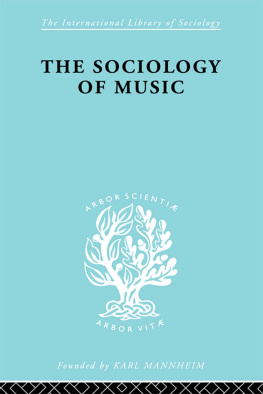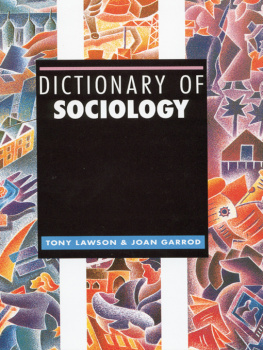The International Library of Sociology
SOCIOLOGY OF THE RENAISSANCE
The International Library of Sociology
HISTORICAL SOCIOLOGY
In 9 Volumes
I | America: Ideal and Reality | Stark |
II | British Social Work in the 19th Century | Young et al |
III | Farewell to European History | Weber |
IV | A History of Autobiography in Antiquity Part One | Misch |
V | A History of Autobiography in Antiquity Part Two | Misch |
VI | Men of Letters and the English Public in the 18th Century | Beljame |
VII | New Trends in Education in the 18th Century | Hans |
VIII | Peasant Renaissance in Yugoslavia 1900-1950 | Trouton |
IX | Sociology of the Renaissance | Von Martin |
SOCIOLOGY OF THE RENAISSANCE
by
ALFRED VON MARTIN
Translated from the German by
W. L. LUETKENS
First published in England, 1952 by
Routledge
Reprinted in 1998 by
Routledge
2 Park Square, Milton Park, Abingdon, Oxon, OX14 4RN
Transferred to Digital Printing 2007
1952 RuthTrouton
All rights reserved. No part of this book may be reprinted or reproduced or utilized in any form or by any electronic, mechanical, or other means, now known or hereafter invented, including photocopying and recording, or in any information storage or retrieval system, without permission in writing from the publishers.
The publishers have made every effort to contact authors/copyright holders of the works reprinted in The International Library of Sociology. This has not been possible in every case, however, and we would welcome correspondence from those individuals/companies we have been unable to trace.
British Library Cataloguing in Publication Data
A CIP catalogue record for this book
is available from the British Library
Peasant Renaissance in Yugoslavia 1900-1950
ISBN 0-415-17614-X
Historical Sociology: 9 Volumes
ISBN 0-415-17825-8
The International Library of Sociology: 274 Volumes
ISBN 0-415-17838-X
Publishers Note
The publisher has gone to great lengths to ensure the quality of this reprint but points out that some imperfections in the original may be apparent
CONTENTS
AUTHORS PREFACE
The present essay was originally conceived in answer to a request from the sociologist Alfred Vierkandt of Berlin University, asking me to write the articles on the Middle Ages and the Renaissance for his Handwrterbuch der Soziologie. The latter article in particular assumed proportions which made it necessary to omit considerable parts in the Encyclopedia, among them the chapters dealing with the relationships obtaining between the capitalist propertied classes and the humanist intelligentsia. In order to give due attention to this particular question, the present author dealt with it in an article in the Archiv fr Sozialwissenschaft. Neither the contribution to the Encyclopedia nor the article were more than fragments of the whole; my desire to publish the work in its entirety was encouraged by the fact that so far no attempt has ever been made to give a complete sociological analysis from every historical aspect of a self-contained historical period. That is to say, incidentally, that this work may hope to be accorded that indulgence to which every pioneer effort is entitled.
A number of objections may be raised at once, and they all arise from this fundamental question: what is the purpose of sociological interpretation? It cannot dispense with the concept of the ideal type which was evolved by Max Weber, who remains the greatest German sociologist and was at the same time an erudite historian. To be sure, not only the sociologist but also the historian cannot forgo this concept as soon as the division into periods is more to him than a matter of practical convenience, and involves the fundamental query of his work: the question as to the spirit, the essence of a period, for example, the essence of the Renaissance or the Middle Ages. The answer to the sociological question, which must always concern itself with the social conditioning and the social function of the spirit of an age, is that it is determined by the economic, political and cultural ruling class. It analyses the civilization under review, laying bare its roots.
The present author has chosen these guiding lines in his approach to the Renaissance (a period with which he is familiar through studies in cultural and intellectual history extending over a period of years); he has attempted to demonstrate what is sociologically typical in all its aspects. He was thus forced to focus attention on those facets of the period which most clearly demonstrate its bourgeois and specifically modern side. Seeing that at bottom the Renaissance is an Italian phenomenon, just as the Middle Ages and the genuine Romantic Revival were German and the Age of Reason West European, the limitation of this study to Italy was fairly obviously indicated. Furthermore, a typological preference for the bourgeois metropolis of Florence was in place, following Karl Brandi, who in his short but excellent book on the Renaissance also takes its history, together with that of Rome, as being characteristic of the times. In spite of these limitations, or rather on account of the nature of the selection made, the author believes that the present sociological analysis can lead to certain conclusions about the bourgeoisie as such: it can reveal the essence of the bourgeoisie as manifested in the first modern civilization created by it, by showing what parts of it were typical. It was the authors aim by this sociological study of the Renaissance to come to conclusions which go beyond the explanation of a completed historical process of the past, and which are relevant for the understanding of all bourgeois culture, including that of our own time. It is for this reason that mediaeval aspects have been excluded, though they were of course still very prominent during the Renaissance: no period can conceal its origins any more than a man can. Thus static and traditionalist elements which remained by way of obstruction in the era of early capitalism receive passing notice at best.
If this essay speaks of a social and cultural development leading from the Early to the Full and lastly to the Late Renaissance, this is not intended in the purely chronological and genetic sense of the historian. It is purely sociological and the intention is to plot certain rhythms which arise from the structural type of bourgeois civilization. The terms Early or Late Renaissance are but the milestones of an ideally typical development, corresponding to the psychology of the bourgeoisie in its different generations. Which psychological state is dominant at any time depends upon what stage social developments have reached, upon whether the bourgeoisie is still rising or whether it has reached or even passed the zenith of its course.







